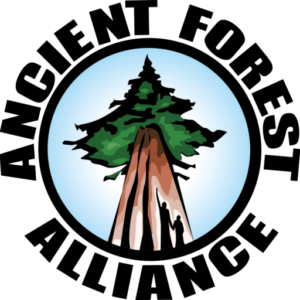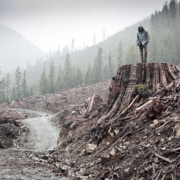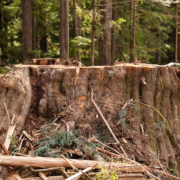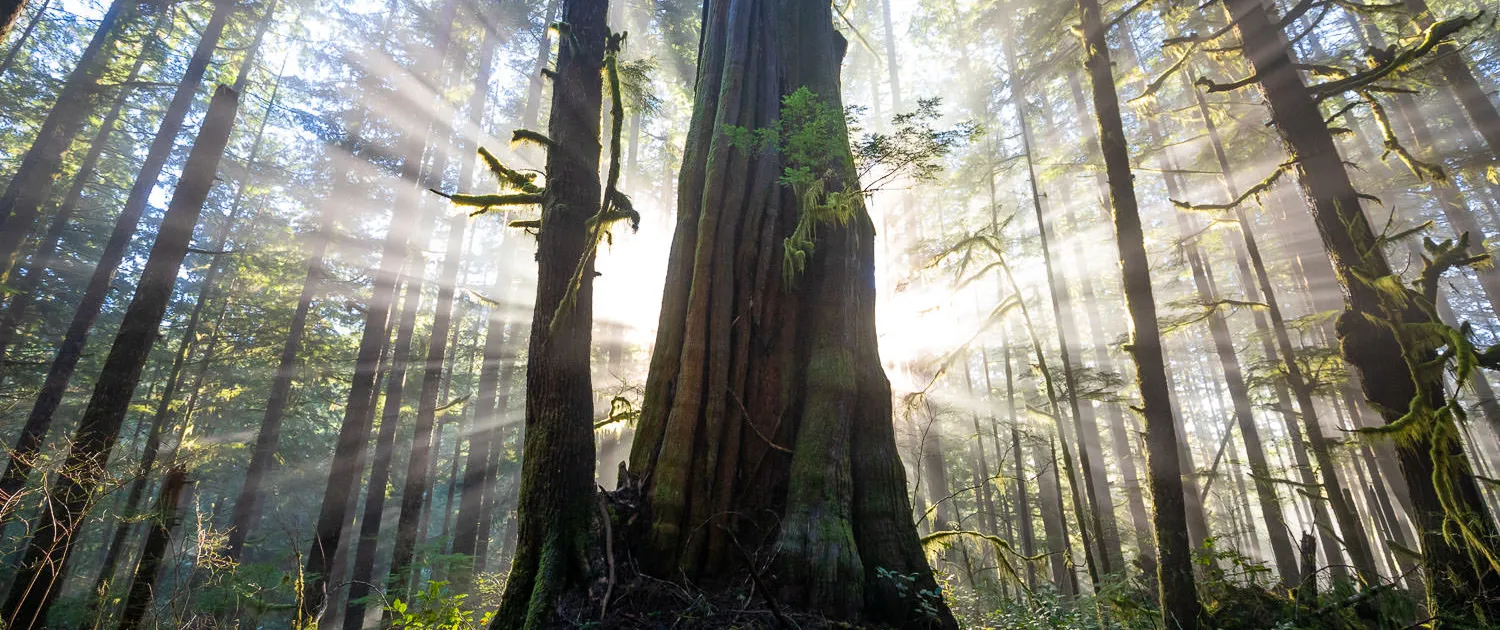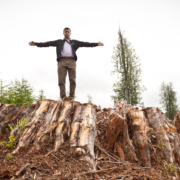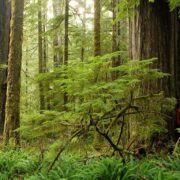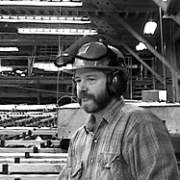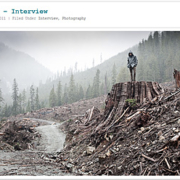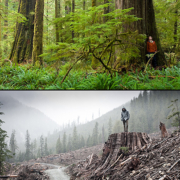B.C.’s Best Old-Growth Forest Slideshow Visits Salt Spring
/in News Coverage/by TJ WattAncient Forest Alliance co-founders are bringing spectacular photographs of Canada’s largest trees and their presentation on B.C. ecology and forest politics to the island next week.
Ken Wu and TJ Watt will host an informative and inspiring slideshow at The Fritz cinema on Wednesday, Feb. 9 from 7 to 8:30 p.m.
Adriane Carr, deputy leader of Canada’s Green Party and former Wilderness Committee Clayoqout Sound campaigner, will also give a talk and host a fundraiser pledge auction to raise campaign funds for the AFA, which has just passed its one-year anniversary.
“Time is running out for our endangered old-growth forests and B.C.’s coastal forestry jobs. Salt Spring Island is famous as a hub of environmental consciousness — it may very well have the highest density of tree-huggers in North America. It’s a key place for us to build support and expand our strong campaign to protect our ancient forests, ensure sustainable second-growth forestry and to ban raw log exports to foreign mills,” states campaign director Wu.
According to the AFA, to date about 75 per cent of Vancouver Island’s productive old-growth forest has been logged, including 90 per cent of the valley bottoms, while only six per cent of its original, productive old-growth forests are protected in parks.
Meanwhile, thousands of forestry jobs are being lost as millions of cubic metres of raw logs are exported each year to foreign mills.
The AFA plans to take their campaign to a new level in 2011 by:
• Vastly increasing the support base for its campaigns through the “100,000 Strong for Ancient Forests and B.C. Jobs” petition drive and public awareness campaign.
• Increasing cooperation among key allies by meeting and working with First Nations, politicians, businesses, unions, faith groups and many other organizations.
• Guiding monthly public hikes to the spectacular Avatar Grove near Port Renfrew and other endangered ancient forests.
• Continuing to explore and document endangered old-growth forests in B.C. through professional photography and videos.
“How many jurisdictions on Earth have trees with trunks as wide as living rooms and that grow as tall as downtown skyscrapers?” asks Watt.
“We’re so lucky to have such exceptionally magnificent forests here in coastal B.C. I am always excited to share some of the best photographs from Vancouver Island’s most incredible rainforests and hidden wild places.
original article in bclocalnews.com saltspringislanddriftwood
CFAX Radio Interview (on Youtube): Climate and Old-Growth Forests with Sierra Club of BC’s Jens Wieting
/in News Coverage/by TJ WattLink to video on Youtube: https://www.youtube.com/watch?v=lXIcjHP8knE
Ancient forest group continues push for old-growth
/in News Coverage/by TJ WattIn just over a year, the Ancient Forest Alliance has collected almost 7,000 petition signatures, 18,000 supporters and fundraised more than $50,000.
Not bad for an environmental group in it’s infancy, says cofounder Ken Wu.
The non-profit organization founded in January 2010 is working to protect old-growth tree stands through B.C., including some on the West Shore.
“The western communities have some real gems of old growth,” Wu said. “On the Department of National Defence lands in Colwood and Metchosin, you’ve got some of the finest old-growth Douglas fir stands on the planet. It’s a spectacular place.”
AFA members spent the last year hunting the south Island for old-growth stands to document and photograph. It’s trying to put pressure on the B.C. government to protect old-growth stands for future generations.
“I think a lot of people realize this is a spectacular part of the world and the unfortunate thing is that the B.C. Liberal government still contends that old growth forests are not endangered on Vancouver Island, which is nuts … our old growth forests are now in tatters and are now a teeny fraction of what they once were.”
AFA’s discovery of an old-growth stand near Port Renfrew, dubbed Avatar Grove, has some of the largest trees on the Island and in Canada, Wu said. It’s in an area zoned for logging, with rights belonging to Surrey-based Teal Jones Group. The AFA is now offering guided public hikes to the area every month.
“It’ll knock your socks off,” Wu said. “It’s got Canada’s gnarliest tree. This tree’s got a burl that is 12 feet wide — something that can only happen in an old-growth forest.”
Looking forward into 2011, Wu says he’s optimistic about the upcoming leadership races for the B.C. Liberals and B.C. NDP.
“There’s great potential for new progressive environmental policies, but we’ve got to snowball the size of the movement to ensure that happens,” he said.
The AFA is trying to collect 100,000 signatures for a petition calling on the government to protect old-growth forests and forestry jobs.
One of the ways it intends to do that is through a provincewide slideshow tour. The team will be traveling across the province delivering photo presentations about the most endangered old-growth stands, including Avatar Grove, Flores Island and the upper Walbran Valley.
Wu says the AFA already enjoys tremendous support from government representatives regionally, provincially and federally. Mike Hicks, CRD Juan de Fuca regional director; John Horgan, Juan de Fuca NDP MLA; Keith Martin, Liberal MP; the Sooke Tourism Association and the Port Renfrew Chamber of Commerce are all calling for the protection of Avatar Grove, according to Wu.
“Ultimately, it’s up to the BC government to make a land use order to protect the Avatar Grove and eventually to establish new protective areas too. We need to protect the old-growth across Vancouver Island and throughout much of the province because it’s so endangered now.”
Link to original article no longer available: https://www.bclocalnews.com/vancouver_island_south/goldstreamgazette/news/115027064.html
Searching for the ‘sweet spot’ in the carbon debate
/in News Coverage/by TJ WattIn the recent global climate talks in Cancun, Mexico this past December, then Federal Minister of Environment, John Baird, said that conserving and managing our forests sustainably is “one of the most inexpensive ways to combat global warming and to see carbon reductions.”
The valuable contribution intact forests make in conserving natural carbon stores to help in the fight against climate change has been largely overlooked in BC. Like a bank account that can store carbon away for hundreds of years, the service of keeping carbon in the ground and out of the atmosphere, is provided free of charge by our intact forests. When forests are logged, the carbon-rich soils, forest floor, and woody biomass release much of that stored carbon into the atmosphere.
The British Columbia Greenhouse Gas Inventory Report 2008 reveals that logging and slash burning – although not officially included in the accounting — were responsible for 63,246,000 tons (gross) of CO2-equivalent greenhouse gas emissions. This is higher than the total greenhouse gas emissions from BC’s entire energy sector for that year — including emissions from road transportation, and fossil fuel and manufacturing industries.
Most climate change experts and conservation organizations, and a growing number of corporations and communities, agree that meeting robust targets to reduce greenhouse gases like carbon dioxide, as soon as possible, must be a societal priority. For many companies and communities, it will take time to reduce carbon- and other greenhouse gas-intensive infrastructure. Fortunately, BC’s coastal and other primary forests store vast amounts of carbon for us now, when we need it, not decades into the future, such as when seedlings grow into trees.
High quality forest conservation carbon offsets are one financial tool that can prevent emissions of tremendous amounts of carbon into the atmosphere, thereby helping in the fight against global climate change. Used strategically, if the areas conserved are large enough and form part of a broad conservation network, these offset projects also have the potential to help protect species such as the grizzly, salmon, and birds as they struggle to survive the impacts of a changing climate. In addition, economic benefits from the sale of truly high quality forest conservation offsets flow to landowners or communities — including First Nations — which can improve human well-being and provide a conservation-based economic alternative to land degradation.
Forest offsets for carbon emissions, and carbon offsets generally, can be a greenwash marketing strategy if not coupled with concurrent measures to make ever-increasing and real reductions in greenhouse gas emissions. Added to that, there are ‘good’ projects that meet the intended objectives and there are others that fall flat, giving all carbon offset projects a bad rap. This is why it’s incredibly important to recognize and support ‘good’ projects. For that, we need to have standards for carbon offsets that are rigorous – so that we can trust the projects and help the climate.
BC has some of the world’s most carbon-rich forests – one needn’t look farther than western Vancouver Island and all along BC’s emerald coastline. If BC can find the “sweet spot” wherein species habitat and the ecosystem services that ensure our survival – such as natural carbon storage — can be protected, and wherein conservation of more forest can provide alternate, revenue streams for community well-being, shouldn’t that be of great interest to all British Columbians? The Tofino District Council and the Tofino-Long Beach Chamber of Commerce — both of which exist and operate within the Clayoquot Sound UNESCO Biosphere Reserve — have recently sent in letters of support for forest carbon offset projects that conserve intact forests.
The deadline for the BC Ministry of Environment to receive public comments on the draft Forest Carbon Offset Protocol is fast-approaching. It is important that they establish rigorous standards for all forest offset projects that result in ‘real’ avoided or reduced emissions, or in robust greenhouse gas removals, and at minimum, do not cause net environmental harm.
Marlene Cummings is the BC Forest Campaigner with ForestEthics, and has a Master of Science in Environmental Planning from the University of British Columbia.
Link to original article: https://communities.canada.com/vancouversun/blogs/communityofinterest/archive/2011/01/27/searching-for-the-sweet-spot-in-the-carbon-debate.aspx
The Death Of A Sawmill
/in Announcements, News Coverage/by TJ WattThe tenth anniversary of closure of Timberwest’s Youbou sawmill — and its economic and family fallout — will be discussed during tomorrow’s Eye-Opener Film Series in Duncan.
The Cowichan Citizens’ Coalition will screen the documentaries Stump To Dump, and Raw Log Exports made by Lake Cowichan Secondary School students.
Discussion will involve Youbou Timberless Society members, plus Ken Wu and T.J. Watt of the Ancient Forest Alliance.
YTS, the Tree-Huggers and Tree-Cutters Alliance, and the Citizens’ Coalition were formed after protests about the mill’s demise on Jan. 26, 2001.
It was allowed shut by Victoria after then-forests minister, Dave Zirnhelt, signed a document that removed Clause 7 linking Timberwest’s annual allowable cut to keeping the mill open.
The mill’s closure tossed some 220 workers out of jobs, sparking seven years of failed court challenges by the YTS.
Bitterness of the closure still simmers among YTS members and local families.
In the 2006 24-minute Ban Raw Log Exports, filmmakers Brent Rayner and buddies Travis Stock, Reece Docherty and Cody Lawson express their anger about what they see as corporate mismanagement of Crown timber, and raw-log exports allowed by Victoria while wood-manufacturing jobs go begging.
“The Liberals aren’t listening,” said Rayner. “They’re after the money and we’re all just numbers.”
The selective-logging fan said the 2007 disappearance of his unemployed Youbou mill-worker father, Darreld, isn’t linked to the operation’s closure.
“He wouldn’t have done that to our family.”
Stock — whose dad, Ken, works for Island Pacific Logging — said raw-log exports make no sense.
“I hope people see how our logs are sent to the states when we have families here to be employed processing those logs.”
Your ticket
What: Youbou mill closure films and discussion
When: Jan. 20, 7 p.m.
Where: Duncan United Church, Ingram Street
Tickets: By donation. Call 250-701-1682
The closure of the Youbou Sawmill, 10 years later
/in News Coverage/by TJ WattThe closure of the Youbou sawmill 10 years ago and the resulting formation of the historically important environmentalist and forestry workers alliance, the Tree-Huggers and Tree-Cutters Alliance are being commemorated by activists this week.
The Youbou TimberLess Society (YTS) will be hosting a film screening of their documentary videos Stump to Dump, and Log Exports, produced by Lake Cowichan Secondary School students, at the Duncan United Church Hall, Jan 20, at 7 p.m.
A discussion with YTS members and Ken Wu and TJ Watt of the Ancient Forest Alliance will follow.
“The closure of the Youbou sawmill in 2001 because TimberWest wanted to export raw logs instead of processing them in the community set the stage for a historically important alliance between the workers and environmentalists, who both opposed the mill’s closure and the export of raw logs to foreign mills,” states Ken James, President of the Youbou TimberLess Society.
“Who knew it would have set the stage for a much larger cooperation between environmentalists and forestry workers?”
“Ken James, Roger Wiles, Darreld Rayner, and the whole Youbou TimberLess Society crew are seriously historically important figures for the betterment of this province,” states Ken Wu, Ancient Forest Alliance executive director. “Prior to them coming on board, environmentalists and forestry workers were typically pitted against each other, often in extreme conflicts, while the forest companies went laughing to the bank with profits from liquidating our endangered ancient forests and eliminating BC milling jobs.”
On January 26, 2001, TimberWest closed its Youbou sawmill on the shores of Lake Cowichan.
This move threw 220 workers into unemployment.
The company claimed the mill was unprofitable; a claim contested by many, and upon its closure subsequently continued to log at breakneck speeds while exporting the unprocessed logs to US and Asian sawmills. TimberWest is the largest exporter of raw logs from BC.
A few months before the mill’s closure, sawmill worker Ken James and environmentalist Ken Wu (at the time the executive director of the Western Canada Wilderness Committee’s- WCWC- Victoria chapter, now with the Ancient Forest Alliance) were invited to speak together at a forum at the BC Government Employees Union building in downtown Victoria to an audience of a hundred forestry workers and environmentalists.
The two groups found much in common in their perspectives to end raw log exports and to ensure a sustainable second-growth forest industry.
Subsequently, the two groups started to attend and speak at each other’s rallies and events.
The cooperation between the Youbou TimberLess Society and the Victoria WCWC paved the way for further cooperation between environmentalists and the Pulp, Paper, and Woodworkers of Canada (PPWC) union in Nanaimo and Crofton on Vancouver Island, led by Arnie Bercov, and forestry workers with the Save Our Valley Alliance (SOVA) in Port Alberni.
Environmentalists also started to work on specific projects and speak at events with the United Steelworkers (USW) union, BC’s main logging union, which took over the International Woodworkers of America IWA union around the same time, and with the Communications, Energy, and Paperworkers (CEP) union, against increasing raw log exports and the deregulation of the forest industry through the so-called Forestry Revitalization Act in 2004.
“The cooperation between environmentalists and forestry workers that we pioneered has dismantled much of the ‘jobs versus the environment’ framing of BC’s forestry debate,” states Ken James.
“Today, the vast majority of people support saving jobs and the environment by protecting our last old-growth forests on Vancouver Island, ensuring sustainable second-growth forestry, and ending the export of raw logs to foreign mills.
The only problem is the BC government still doesn’t get it. But they will have to, not long from now,” states Ken Wu.
Link to original article: https://www.bclocalnews.com/vancouver_island_central/lakecowichangazette/business/113969939.html
VIDEO: Victoria Community TV Presents: Face to Face with Avatar Grove
/in News Coverage/by TJ WattWe are joined by Ken Wu and TJ Watt from The Ancient Forest Alliance, along with some great images of this magnificent old growth forest.
We also talk about ‘the big picture’ of saving what is left of BC’s old growth forests, and the threats that still face it today.
You can watch the video on cable television as well:
On Channel 11 – In Victoria and Saltspring Island
Saturday, Jan. 15 at 11AM and 11:30PM
Sunday Jan 16 at 10AM and 9PM
Unfortunately, the link to the video from ICTV Victoria on Vimeo doesn’t exist anymore.
Interview with TJ Watt – Photographer and Environmentalist
/in News Coverage/by TJ WattPlease follow this link to read the interview and see the photographs: https://dondenton.ca/2011/01/11/tj-watt-interview/
Poor BC Logging Practices "add to gas emissions"
/in News Coverage/by TJ WattMassive emissions of greenhouse gases are coming from BC’s coastal forests because of poor logging practices and inadequate management, according to a new report by environmentalists.
The carbon from coastal rainforests, much of which comes from Vancouver Island, is not counted in BC’s official emissions tally as, at the international level, Canada and the provinces decided against including forests.
If they were included, emissions numbers for BC would increase by 24 per cent, said Jens Wieting, coastal forests campaigner for Sierra Club BC and author of the group’s report, “Restoring the Balance for Climate and Species.”
“These emissions are not caused by the mountain pine beetle or large fires, as in other parts of BC. They are mainly produced by inadequate logging practices and insufficient management, and it’s time for that to change,” Wieting said.
Coastal rainforests have the ability to store massive amounts of carbon, which should make them a key asset in the fight against global warming, he said.
“We are throwing away a tremendous opportunity and our best defence against climate change.”
Clearcutting in old-growth forests, that have accumulated carbon for thousands of years, is pushing species to extinction, Wieting said.
Vancouver Island has the most forest ecosystems at a very high risk for species extinction and the lowest level of overall protection — only 13.2 per cent — he said.
Making matters worse, about 45 per cent of the 42,000 hectares of new Vancouver Island Old Growth Management Areas, although a step in the right direction, consists of poor- productivity ecosystems, Wieting said.
“Vancouver Island belongs in the ICU [intensive care unit]. It is in the worst shape with the risk of species extinction and protection of productive ecosystems,” he said.
New areas off-limits to logging are not chosen on the basis of ecosystems with the highest risk for species extinction and only six per cent would meet the high productivity criteria, the report says.
Climatologist Andrew Weaver, University of Victoria Canada Research Chair in Climate Modelling and Analysis, said the report underlines the need to think about the bigger picture when it comes to forest plans.
“The Sierra Club is absolutely spot-on that forests are a huge potential source and potential sink of carbon and it’s a lot better to use them as a sink rather than turning them into a source,” he said.
Weaver said he does not know whether it is feasible for carbon emissions from forests to be included in Canada’s reports to the international community on greenhouse gas emissions, a recommendation of the report. “But what matters is not the UN bookkeeping perspective, it’s the climate care perspective. … The atmosphere doesn’t really care how you account for carbon, it cares about what goes up,” he said.
Other recommendations in the report include shaping forest policy around using forests as carbon sinks. To do that there must be increased conservation, improved forest management and measures to reduce the risks of fire and pests, it says.
Interesting links
Here are some interesting links for you! Enjoy your stay :)Pages
- ACTION ALERT: Tell the NDP government FRPA amendments must protect old-growth forests
- AFA Policy Recommendations – 2025
- Ancient Forests
- BC Protected Areas Strategy (PAS)
- Before & After Logging – Caycuse Watershed
- Before and After Logging Caycuse 2022
- Biggest Trees
- Bugaboo Ridge Ancient Forest
- Call Premier Horgan to demand funding for old-growth protection in Budget 2022
- Call the BC government
- Cameron Firebreak
- Canada’s Most Impressive Tree – Flores Island
- Cast Your Vote for Ancient Forest Protection!
- Caycuse Logging From Above
- Central Walbran Valley
- Climbing the Largest Spruce in Carmanah
- Conservation Financing
- Contact
- Donate Stocks, Securities, and Mutual Funds
- Echo Lake
- Economic Valuation of Old-Growth Forests on Vancouver Island
- Ecosystem-Based Targets
- Edinburgh Mountain Ancient Forest
- Eldred River Valley
- Exploring & Climbing Ancient Giants
- Fairy Creek Headwaters
- Granite Creek Logging
- Grove of Giant Cedars Clearcut in Quatsino Sound
- Have your say on the BC government’s Old-Growth Strategy
- Hiking Guides
- Home
- Join the Growing Number of BC Businesses Calling for Old-Growth Forest Protection
- Juniper Ridge
- Kanaka Bar Indigenous Protected and Conserved Area
- Kanaka Bar IPCA Proposal
- Katlum Creek
- Katlum Creek
- Klaskish Inlet
- Loup Creek
- Lower Caycuse River
- Mahatta River Logging
- Massive Trees Cut Down
- McKelvie Valley
- McLaughlin Ridge
- Mossy Maple Rainforest
- Mount Horne
- Mt. Freda Ancient Forests
- Nahmint Logging 2024
- Nahmint Valley
- Nahmint Valley
- Old Growth Strategic Review Questionnaire Guide
- Old-Growth 101 – The Facts on Ancient Forests in BC
- Old-Growth Campaigns
- Old-Growth Forest Hikes Near Port Renfrew
- Old-Growth Forest Hikes Near Victoria BC
- Our Mission & Team
- Our Work
- Petition
- Photographer TJ Watt
- Photos & Media
- Policy recommendations to support sustainable, value-added, second-growth forestry jobs in BC
- Pop for Parks Report
- Privacy Policy
- Protect Old-Growth Forests & Endangered Ecosystems in BC
- Provincial Biodiversity and Ecosystem Health Framework
- Provincial Land Acquisition Fund
- Quatsino Old-Growth Under Threat 2023
- Recent News
- Salmon Parks Initiative
- Send a Message
- Send a Message
- Send a Message
- Spruce Bay Old Growth Trail – Port Alice
- Sydney River Valley
- Taylor River Valley
- Thank you for speaking up for ancient forests!
- Thank you for speaking up for BC’s last remaining ancient forests!
- Thank you for speaking up for BC’s last remaining ancient forests!
- Thank you for speaking up for endangered ecosystems!
- Thank You for Speaking Up for Old-Growth Forests!
- Thank you for taking action for ancient forests, your call will begin shortly!
- Thank you for taking action for old-growth
- Thank you for taking action for old-growth
- Vernon Bay
- Videos
- Walbran Headwaters At Risk
- Ways to Take Action
- White River Provincial Park
- Work With Us
- z__Archive Footer – DO NOT EDIT
- z__Footer – DO NOT EDIT
- z__Pre-Footer – DO NOT EDIT
- z__Single Post Footer – DO NOT EDIT
- z__Take Action row – DO NOT EDIT
- z_Send a Message – Call for Ecosystem Based Targets
- Activity Reports
- Ancient Forest / Chun T’oh Whudujut Provincial Park
- Before & After Old-Growth Maps
- 2018 Activity Report & Financials
- History & Successes
- Old-Growth Forests in BC: Frequently Asked Questions
- Parthenon Grove
- 2017 Activity Report & Financials
- Directions to Avatar Grove
- Upper Tsitika Valley
- 2016 Activity Report & Financials
- Avatar Boardwalk
- Building Alliances
- 2015 Activity Report & Financials
- Avatar Grove
- Myths & Facts
- Big Lonely Doug and Clearcut
- Policy Recommendations
- Biggest Stumps
- Port Renfrew Big Trees Map
- Publications
- Cameron Valley Firebreak
- Research & Reports
- Carmanah Research Climb
- Castle Grove
- Cathedral Grove Canyon
- Central Walbran Ancient Forest
- Children’s Forest
- Day Road Forest
- East Creek Rainforest
- Echo Lake
- Eden Grove
- Flores Island
- Hadikin Lake
- Haida Gwaii
- Jurassic Grove
- Klanawa Valley
- Koksilah
- Low Productivity Old-Growth
- McKelvie Valley
- McLaughlin Ridge
- Meares Island
- Mossome Grove
- Mossome Grove Tree Climb
- Mossy Maple Gallery
- Mossy Maple Grove
- Mount Horne
- Mt. Elphinstone Proposed Park Expansion
- Nootka Island
- Roberts Creek Headwaters
- Squirrel Cove Ancient Forest
- Stillwater Bluffs
- Tahsis: Endangered Old-Growth Above Town
- Tree Climb 2014
- Tree Climb 2016
- Walbran Logging
- Walbran Overview
Categories
Archive
- September 2025
- August 2025
- July 2025
- June 2025
- May 2025
- April 2025
- March 2025
- February 2025
- January 2025
- December 2024
- November 2024
- October 2024
- September 2024
- August 2024
- July 2024
- June 2024
- May 2024
- April 2024
- March 2024
- February 2024
- January 2024
- December 2023
- November 2023
- October 2023
- September 2023
- August 2023
- July 2023
- June 2023
- May 2023
- April 2023
- March 2023
- February 2023
- January 2023
- December 2022
- November 2022
- October 2022
- September 2022
- August 2022
- July 2022
- June 2022
- May 2022
- April 2022
- March 2022
- February 2022
- January 2022
- December 2021
- November 2021
- October 2021
- September 2021
- August 2021
- July 2021
- June 2021
- May 2021
- April 2021
- March 2021
- February 2021
- January 2021
- December 2020
- November 2020
- October 2020
- September 2020
- August 2020
- July 2020
- June 2020
- May 2020
- April 2020
- March 2020
- February 2020
- January 2020
- December 2019
- November 2019
- October 2019
- September 2019
- August 2019
- July 2019
- June 2019
- May 2019
- April 2019
- March 2019
- February 2019
- January 2019
- December 2018
- November 2018
- October 2018
- September 2018
- August 2018
- July 2018
- June 2018
- May 2018
- February 2018
- January 2018
- December 2017
- November 2017
- October 2017
- September 2017
- August 2017
- July 2017
- May 2017
- April 2017
- March 2017
- February 2017
- December 2016
- November 2016
- October 2016
- September 2016
- August 2016
- July 2016
- June 2016
- May 2016
- April 2016
- March 2016
- February 2016
- January 2016
- December 2015
- November 2015
- October 2015
- September 2015
- August 2015
- July 2015
- June 2015
- May 2015
- April 2015
- March 2015
- February 2015
- January 2015
- December 2014
- November 2014
- October 2014
- September 2014
- August 2014
- July 2014
- June 2014
- May 2014
- April 2014
- March 2014
- February 2014
- January 2014
- December 2013
- November 2013
- October 2013
- September 2013
- August 2013
- July 2013
- June 2013
- May 2013
- April 2013
- March 2013
- February 2013
- January 2013
- December 2012
- November 2012
- October 2012
- September 2012
- August 2012
- July 2012
- June 2012
- May 2012
- April 2012
- March 2012
- February 2012
- January 2012
- December 2011
- November 2011
- October 2011
- September 2011
- August 2011
- July 2011
- June 2011
- May 2011
- April 2011
- March 2011
- February 2011
- January 2011
- December 2010
- November 2010
- October 2010
- September 2010
- August 2010
- July 2010
- June 2010
- May 2010
- April 2010
- March 2010
- February 2010
- January 2010
